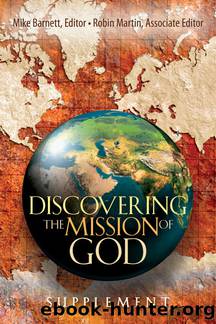Discovering the Mission of God Supplement by Barnett Mike;Martin Robin;

Author:Barnett, Mike;Martin, Robin; [Barnett, Mike]
Language: eng
Format: epub
Publisher: InterVarsity Press
Published: 2012-08-01T00:00:00+00:00
Such opinions may be expected from Hollywood, but more and more often today, this answer is showing up in churches. Katharine Jefferts Schori, the first female presiding Episcopal Bishop in America has said, âIf we insist that we know the one way to God, we've put God in a very small box.â[46]
People who wish to seem tolerant and enlightened want to avoid appearing as if their own faith is better than someone elseâs. In fact, according to one recent survey conducted by the Pew Forum on Religion and Public Life, seven out of ten Americans would say that their religion is only one of many ways to God. Even among people describing themselves as evangelical, more than half would agree with that statement.[47]
While many would question the accuracy of the study,[48] it is clear that even many evangelical Christians believe that Jesus is a way, but not the only way.
A SECRET WAY!
âPraise God! We have seen several hundred âBridgeâ people (an Islamic people group in Southeast Asia) come to faith in Christ!â The missionary was astounded to hear this report, since the Bridge (not their real name) are famously resistant to the gospel. âPraise God! Thatâs amazing!â was the immediate response from the missionary. And then he began to ask some more detailed questions.
âWhat do they believe about Jesus? Do they know him as the Son of God? Do they know him as God? Do they believe that he died on the cross for their sins and was raised on the third day?â
âOh no,â came the reply, âthey are simple farmersâwe did not want to confuse them with theology.â This answer reflects a common belief about Jesusâ role in salvationâJesus may be the way, but the people who are being saved donât need to understand thisâor even know his name.
The Second Vatican Council (also known as Vatican II) was held in the 1960s as an opportunity for the Catholic Church to review their major doctrines and practices and allow in some âfresh air.â It was during this time that Catholic mission theology was radically transformed to make room for this position.
The basic change in the doctrine was a shift in emphasis from saying that there is no salvation outside the church to saying no salvation without the church. The earlier teaching was that salvation was in Christ alone and that âoutsideâ of Christ and his church a person could not be saved. Since 1965, the emphasis has been that Jesus provides salvation, and a person cannot be saved without his help. However, Jesus could and frequently does provide that salvation through Hinduism or Buddhism or any other religion. As long as a person is sincerely following his or her own religion, Jesus is at work providing salvation through that commitment.[49]
Unfortunately, this way of thinking is gaining more and more credibility in the church at large, even among evangelical missionaries. Frequently under the guise of contextualization, people claim that Christ can enter into a personâs heart and life through their own
Download
This site does not store any files on its server. We only index and link to content provided by other sites. Please contact the content providers to delete copyright contents if any and email us, we'll remove relevant links or contents immediately.
| Adult Ministry | Children's Ministry |
| Counseling & Recovery | Discipleship |
| Evangelism | Missions & Missionary Work |
| Preaching | Sermons |
| Youth Ministry |
Victory over the Darkness by Neil T. Anderson(2727)
The Rape Of Nanking by Iris Chang(2642)
Chosen by God by R. C. Sproul(2051)
Crash the Chatterbox by Steven Furtick(1873)
Habits of Grace by David Mathis(1845)
Knowing God by J.I. Packer(1722)
How To Be Born Again by Billy Graham(1666)
Gospel-Shaped Marriage by Chad van Dixhoorn(1603)
A Prophet with Honor by William C. Martin(1600)
Peace with God by Billy Graham(1569)
Confronting Christianity by Rebecca McLaughlin(1496)
God's Smuggler by Brother Andrew(1436)
Angel Dreams by Virtue Doreen Virtue Melissa(1373)
Whisper by Mark Batterson(1343)
Missionaries by Norman Lewis(1335)
The School of Biblical Evangelism by Ray Comfort(1324)
The Truth War by John MacArthur(1321)
The Poems of Rowan Williams by Rowan Williams(1269)
Do Greater Things by Robby Dawkins(1239)
